Students research colleagues
I've had the good fortune to work with a number of talented student colleagues. Some of their projects and accomplishments are described here.
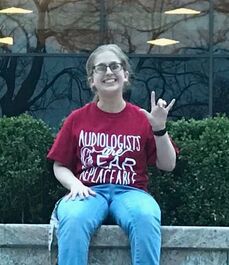
Megan Keyser
Megan is a pre-audiology student in our Natural Sciences program, and is very interested in the processing and use of vocal auditory feedback as a means to shape human language skills. We have devised an experiment to evaluate how the frequency content of human vocal feedback differs between the aural and the cranial auditory conduction pathways, in the hopes of learning how to better inform the modeling of cochlear implant devices for the hearing impaired. Megan will be recruiting and testing human subjects during the Fall (2019) term.
Megan is a pre-audiology student in our Natural Sciences program, and is very interested in the processing and use of vocal auditory feedback as a means to shape human language skills. We have devised an experiment to evaluate how the frequency content of human vocal feedback differs between the aural and the cranial auditory conduction pathways, in the hopes of learning how to better inform the modeling of cochlear implant devices for the hearing impaired. Megan will be recruiting and testing human subjects during the Fall (2019) term.
- Undergraduate research award from the IUP School of Graduate Studies and Research (2019)
- IUP Department of Biology Cynthia Sushak Memorial award (2019)
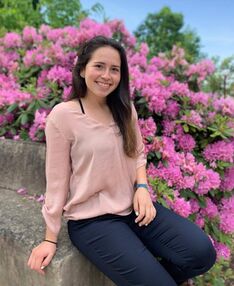
Mariana Valenzuela
Mariana is an Honors College student and a varsity student-athlete here at IUP, and knows all too well how difficult it can be to juggle the many commitments each day brings, and how trade-offs among responsibilities can lead to reduced sleep quality. She has designed a research project to evaluate how disruption of regular sleep can lead to impaired cognitive and physical performance, using physiological markers and activity trackers to assess disordered sleep. She already has become recognized for her research, and will be recruiting test subjects during the Fall (2019) term.
Mariana is an Honors College student and a varsity student-athlete here at IUP, and knows all too well how difficult it can be to juggle the many commitments each day brings, and how trade-offs among responsibilities can lead to reduced sleep quality. She has designed a research project to evaluate how disruption of regular sleep can lead to impaired cognitive and physical performance, using physiological markers and activity trackers to assess disordered sleep. She already has become recognized for her research, and will be recruiting test subjects during the Fall (2019) term.
- IUP Research Experience for Summer Scholars (RESS; 2019)
- Undergraduate research award from the Pennsylvania Academy of Sciences (2019)
- Undergraduate research award from the IUP School of Graduate Studies and Research (2019)
- Admitted to the IUP Cook Honors College (2017)
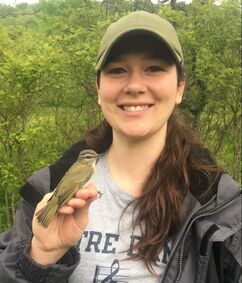
Rebeccah (Jade) Bailey
Jade joined the Biology Honors Program in 2018, with a focus on the intersection between animal physiology and conservation. Through her work in the veterinary field, she has become very interested in how wildlife rehabilitation practices translate into the successful reintroduction of rehabilitated subjects. For her thesis research, Jade is radio-tracking rehabilitated fox squirrels, and evaluating their survival in the wild relative to the rehabilitation practices they experienced. In the meantime, Jade is evaluating doctoral programs in wildlife ecology and conservation. You can reach her at hsxx@iup.edu.
Jade has received numerous awards and accolades for her work, and has presented it at a variety of venues:
Jade joined the Biology Honors Program in 2018, with a focus on the intersection between animal physiology and conservation. Through her work in the veterinary field, she has become very interested in how wildlife rehabilitation practices translate into the successful reintroduction of rehabilitated subjects. For her thesis research, Jade is radio-tracking rehabilitated fox squirrels, and evaluating their survival in the wild relative to the rehabilitation practices they experienced. In the meantime, Jade is evaluating doctoral programs in wildlife ecology and conservation. You can reach her at hsxx@iup.edu.
Jade has received numerous awards and accolades for her work, and has presented it at a variety of venues:
- Presentation at the IUP Scholars Forum (abstract accepted for April conference)
- Presentation at the annual meeting of the Pennsylvania Academy of Sciences annual meeting (abstract accepted for March conference)
- Presentation at the Penn State-Behrend Sigma Xi Undergraduate Research Conference (abstract accepted for April conference)
- IUP Department of Biology Gilly Young Life Scientist Travel Award (2020)
- IUP Biology Samuel Mitrovich Scholarship for the Advancement of the Biological Sciences (2020)
- IUP Provost Scholar (Fall 2019)
- Presentation at the 2020 National Wildlife Rehabilitators Annual Symposium (Feb 2020; South Padre Island, TX; supported by travel awards from the IUP Department of Biology and the IUP Kopchick College of Natural Sciences and Mathematics)
- IUP Aramark Scholarship (2019)
- Presentation accepted at the 2019 PASSHE STEM Student Research Conference (Nov 2019; Kutztown University)
- IUP Research Experience for Summer Scholars (RESS; 2019)
- IUP Biology Undergraduate Research Experience (BURE) award (2019)
- IUP Department of Biology Certificate of Excellence (2019)
- IUP Biology Samuel Mitrovich Scholarship for the Advancement of the Biological Sciences (2019)
- IUP Department of Biology Cynthia Sushak Memorial award (2019)
- Undergraduate research award from the Pennsylvania Academy of Sciences (2019)
- Undergraduate research award from the IUP School of Graduate Studies and Research (2019)
- IUP Department of Biology Certificate of Excellence (2018)
- IUP Biology Samuel Mitrovich Scholarship for the Advancement of the Biological Sciences (2018)
- Presentation at the annual meeting of the Pennsylvania Academy of Sciences (2018)
- Presentation at the IUP Scholars Forum (2018)
- Admitted to the IUP Biology Honors Program (2018)
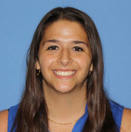
Gina (née Vaira) Munir
Gina came to IUP in 2016 with a research plan already mapped out for her MS thesis work: to explore the cognitive capabilities of siamangs (Symphalangus syndactylus), an endangered gibbon of the non-human primate family Hylobatidae ("lesser apes"). Gina brought to bear her extensive internship and zoological experience, and is the first person to successfully train a gibbon to perform touch-screen cognitive tasking. She has been very busy making arrangements for test subjects at different zoos, and already is presenting her research widely at national and international conferences.
Following her graduation from the MS program in Biology here at IUP, Gina began her PhD studies in the Department of Anthropology at Southern Illinois University. You can find her at gina.munir@siu.edu.
Gina's impressive list of accomplishments during her stay at IUP include
Gina came to IUP in 2016 with a research plan already mapped out for her MS thesis work: to explore the cognitive capabilities of siamangs (Symphalangus syndactylus), an endangered gibbon of the non-human primate family Hylobatidae ("lesser apes"). Gina brought to bear her extensive internship and zoological experience, and is the first person to successfully train a gibbon to perform touch-screen cognitive tasking. She has been very busy making arrangements for test subjects at different zoos, and already is presenting her research widely at national and international conferences.
Following her graduation from the MS program in Biology here at IUP, Gina began her PhD studies in the Department of Anthropology at Southern Illinois University. You can find her at gina.munir@siu.edu.
Gina's impressive list of accomplishments during her stay at IUP include
- Presentation at the American Society of Primatologists annual meeting (San Antonio, TX; Aug 2018; abstract published)
- Invited talk for the Department of Anthropology, University of Southern Illinois (Feb 2018)
- Presentation at the Society for Neuroscience annual meeting (Washington, DC; Nov 2017)
- Commonwealth of Pennsylvania University Biologists (CPUB) 2107 Student Research Award recipient
- American Society of Primatologists 2-Minute Thesis finalist (Washington, DC; Aug 2017)
- Presentation at 2017 American Society of Primatology annual meeting (Washington, DC; 2nd place presentation award; abstract published)
- 2017 Research Experience for Summer Scholars (RESS) participant
- Primate Conservation field course in Borneo (via Miami University and Earth Expeditions)
- Invited presenter for Discovery Canada TV (Toronto, CAN; 2017)
- Presentation at Animal Behavior Society annual meeting (Toronto, CAN; 2017)
- IUP Department of Biology graduate student research award (2017)
- IUP School of Graduate Studies and Research graduate student research award (2017)
- Pennsylvania Academy of Sciences graduate student research award (2017)
- IUP Department of Biology Smythe Scholarship winner (2017)
- IUP Women in Science, Mathematics, and Technology presentation (2017)
- Invited participant at national 3-Minute Thesis competition (Washington, DC; 2017)
- IUP Graduate Scholars Conference 3-Minutes thesis finalist (2017)
- IUP Graduate Scholars Conference presentation (2017; 2nd place award)
- CPUB annual meeting presentation (2017; 1st place award)
- Northeast Evolutionary Primate Conference presentation, Hunter College, New York, NY
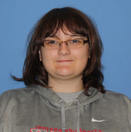
Alexis Vollmer
Lexi conducted research with me, as part of her Biology Honors thesis. Her research is focused upon the role of avian brain region CLM in mate recognition by female zebra finches. During her time at IUP, Lexi presented her research at several venues, including the 2018 IUP Undergraduate Scholars Forum as well as the IUP Women in Science, Mathematics, and Technology forum. Following her graduation from IUP, Lexi is applying to veterinary programs.
Lexi conducted research with me, as part of her Biology Honors thesis. Her research is focused upon the role of avian brain region CLM in mate recognition by female zebra finches. During her time at IUP, Lexi presented her research at several venues, including the 2018 IUP Undergraduate Scholars Forum as well as the IUP Women in Science, Mathematics, and Technology forum. Following her graduation from IUP, Lexi is applying to veterinary programs.
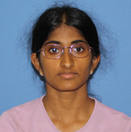
Kusuma Anand
Kusuma joined my research program as a new graduate student in 2015, and began intensively training zebra finches to perform auditory discrimination, in a GO-NOGO operant procedure. Kusuma explored both fixed and reversed reward contingencies, as well as examined the differential manner in which GO and NOGO responses were learned. Kusuma earned numerous presentation and research awards while at IUP, with her achievements including
Following completion of her MS degree in Biology, Kusuma joined the Department of Neurobiology and Behavior at Cornell University. Her thesis research was published in the journal Animal Behavior and Cognition.
Kusuma joined my research program as a new graduate student in 2015, and began intensively training zebra finches to perform auditory discrimination, in a GO-NOGO operant procedure. Kusuma explored both fixed and reversed reward contingencies, as well as examined the differential manner in which GO and NOGO responses were learned. Kusuma earned numerous presentation and research awards while at IUP, with her achievements including
- IUP Women in Science, Mathematics, and Technology presentation (2017; 3rd place award)
- IUP Graduate Scholars Conference presentation (2017)
- CPUB annual meeting presentation (2017; 2nd place award)
- IUP School of Graduate Studies and Research graduate student research award (2016)
- Animal Behavior Society annual meeting presentation, Columbia, MO (2016)
- IUP Women in Science, Mathematics, and Technology presentation (2016; 1st place award)
- IUP Graduate Scholars Conference presentation (2016; 3rd place award)
- CPUB annual meeting presentation (2016; 2nd place award)
Following completion of her MS degree in Biology, Kusuma joined the Department of Neurobiology and Behavior at Cornell University. Her thesis research was published in the journal Animal Behavior and Cognition.

Chris Magulick
Chris joined my lab in 2012, and together with Dr. Katalin Komjati, we devised a study to assess the degree to which variation in human tasking performance is a function of central, as opposed to peripheral, physiological properties.
Chris joined my lab in 2012, and together with Dr. Katalin Komjati, we devised a study to assess the degree to which variation in human tasking performance is a function of central, as opposed to peripheral, physiological properties.

Matt Reitzell
Matt joined my lab in 2011. Over the next year he built and tested a computer-controlled operant training/testing device for use in investigating the neural mechanisms of auditory learning. Matt successfully tested the operant apparatus by training several zebra finches to perform the first stages of auditory operant discrimination. We will follow Matt's behavioral training of our avian subjects with neurophysiological recordings to assess where and how auditory learning has shaped neurons and their performance.
Matt joined my lab in 2011. Over the next year he built and tested a computer-controlled operant training/testing device for use in investigating the neural mechanisms of auditory learning. Matt successfully tested the operant apparatus by training several zebra finches to perform the first stages of auditory operant discrimination. We will follow Matt's behavioral training of our avian subjects with neurophysiological recordings to assess where and how auditory learning has shaped neurons and their performance.
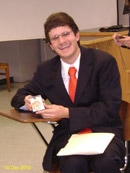
Zackary Ankney
Zack joined my lab in 2010 to conduct a human pulmonary study of his own design in order to assess the ability of human patient body position to compromise pulmonary capabilities, and completed his Biology Honors thesis with this project. Zack was very successful in his research endeavors, including:
- Research presentations at the IUP Undergraduate Scholars Forum and the Commonwealth of Pennsylvania University Biologists’ meetings in 2010
- Undergraduate Research Award from the IUP School of Graduate Studies and Research
- Named the Outstanding Student for the Department of Biology for 2009–2010
- Biology honors thesis entitled “Influence of Body Posture on Pulmonary Flow Rates”
Following graduation from IUP, Zack worked as a medical editor on two health-related textbooks while preparing his applications for medical school. He then began medical studies at the Jefferson Medical College of Thomas Jefferson University, beginning in the Fall of 2012.

Donald Miller
Don joined my lab as a freshman in 2009. Since then, he has served as my teaching assistant in a variety of courses, and also has served as an animal care technician. Don conducted several independent research projects in my lab, including a neural auditory study in the zebra finch as well as study of human exercise physiology, focusing on the coordination of human physiological responses to an exercise challenge.
Don’s research and academic achievements include:
Following his graduation from IUP in 2012, Don began medical studies at the Milton S. Hershey Medical School of the Pennsylvania State University, beginning in the Fall of 2012.
Don joined my lab as a freshman in 2009. Since then, he has served as my teaching assistant in a variety of courses, and also has served as an animal care technician. Don conducted several independent research projects in my lab, including a neural auditory study in the zebra finch as well as study of human exercise physiology, focusing on the coordination of human physiological responses to an exercise challenge.
Don’s research and academic achievements include:
- Smythe Memorial Award from the IUP Department of Biology
- Sushak Undergraduate Fund For Excellence Award from IUP Department of Biology
- Undergraduate Research awards from the IUP School of Graduate Studies and Research (twice)
- Selection as an IUP Ambassador
- Poster presentation at Undergraduate Research at the capital (Pa.)
- Poster presentations at the IUP Undergraduate Scholars Forum (2009, third place award; 2010, first place award)
- Poster presentations at the Commonwealth of Pennsylvania University Biologists’ meetings (2009, second place award; 2010, first place award)
- Pechan scholarship winner from the IUP College of Natural Sciences and Mathematics
- Independent research grants (2) from the Pennsylvania Academy of Science
- Phi Kappa Phi Fellowship
- CPUB Outstanding Student for 2012
- Biology Honors thesis, entitled "Anticipatory physiological changes mediate immediate cardiovascular demands at the onset of human exercise"
Following his graduation from IUP in 2012, Don began medical studies at the Milton S. Hershey Medical School of the Pennsylvania State University, beginning in the Fall of 2012.
Jason Wallach
Jason explored the ability of animal social setting to influence neural processing of communications sounds. Jason recorded male zebra finch song under a variety of social settings (isolated, with female, with another male), and then used these sounds as playback stimuli for assessment of the finch neural auditory response during the same series of social settings.
After graduating from IUP, Jason enrolled in the PhD program in Neuropharmacology at the University of the Sciences, Philadelphia.
Jason explored the ability of animal social setting to influence neural processing of communications sounds. Jason recorded male zebra finch song under a variety of social settings (isolated, with female, with another male), and then used these sounds as playback stimuli for assessment of the finch neural auditory response during the same series of social settings.
- IUP Biology graduate (2008)
- Cook Honors College (2008)
- Biology honors thesis, entitled "Social Modulation of HVC Auditory Response in Taeniopygia guttata, Zebra Finch"
After graduating from IUP, Jason enrolled in the PhD program in Neuropharmacology at the University of the Sciences, Philadelphia.
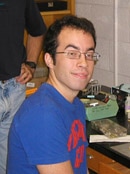
Dominic Luciano
Nick conducted experiments designed to assess the degree to which the left and right hemispheres of the zebra finch brain could independently process sounds. Nick recorded zebra finch songs, and then digitally modified the song frequency structure to create series of auditory test stimuli. These stimuli were used to stimulate neural auditory responses which were assessed in simultaneously dual-hemisphere recording sessions in awake and anesthetized birds.
Following his graduation from IUP, Nick enrolled in the PhD program in Neuroscience at Duke University.
Nick conducted experiments designed to assess the degree to which the left and right hemispheres of the zebra finch brain could independently process sounds. Nick recorded zebra finch songs, and then digitally modified the song frequency structure to create series of auditory test stimuli. These stimuli were used to stimulate neural auditory responses which were assessed in simultaneously dual-hemisphere recording sessions in awake and anesthetized birds.
- IUP Biology graduate (2008)
- Cook Honors College graduate (2008)
- Undergraduate Research Award, IUP Department of Biology
- Biology honors thesis: Hemispheric Asymmetry of HVC Auditory Neural Response
Following his graduation from IUP, Nick enrolled in the PhD program in Neuroscience at Duke University.
Matthew Dimond
During his brief stay in my lab, during 2005-06, Matt recorded and measured zebra finch song stimuli under a variety of zebra finch social settings, and measured their primary characteristics to assess how an audience can influence songs features. After graduation from IUP, Matt enrolled in the doctorate of chiropractic program at New York Chiropractic College.
During his brief stay in my lab, during 2005-06, Matt recorded and measured zebra finch song stimuli under a variety of zebra finch social settings, and measured their primary characteristics to assess how an audience can influence songs features. After graduation from IUP, Matt enrolled in the doctorate of chiropractic program at New York Chiropractic College.
Page last edited Apr 2020